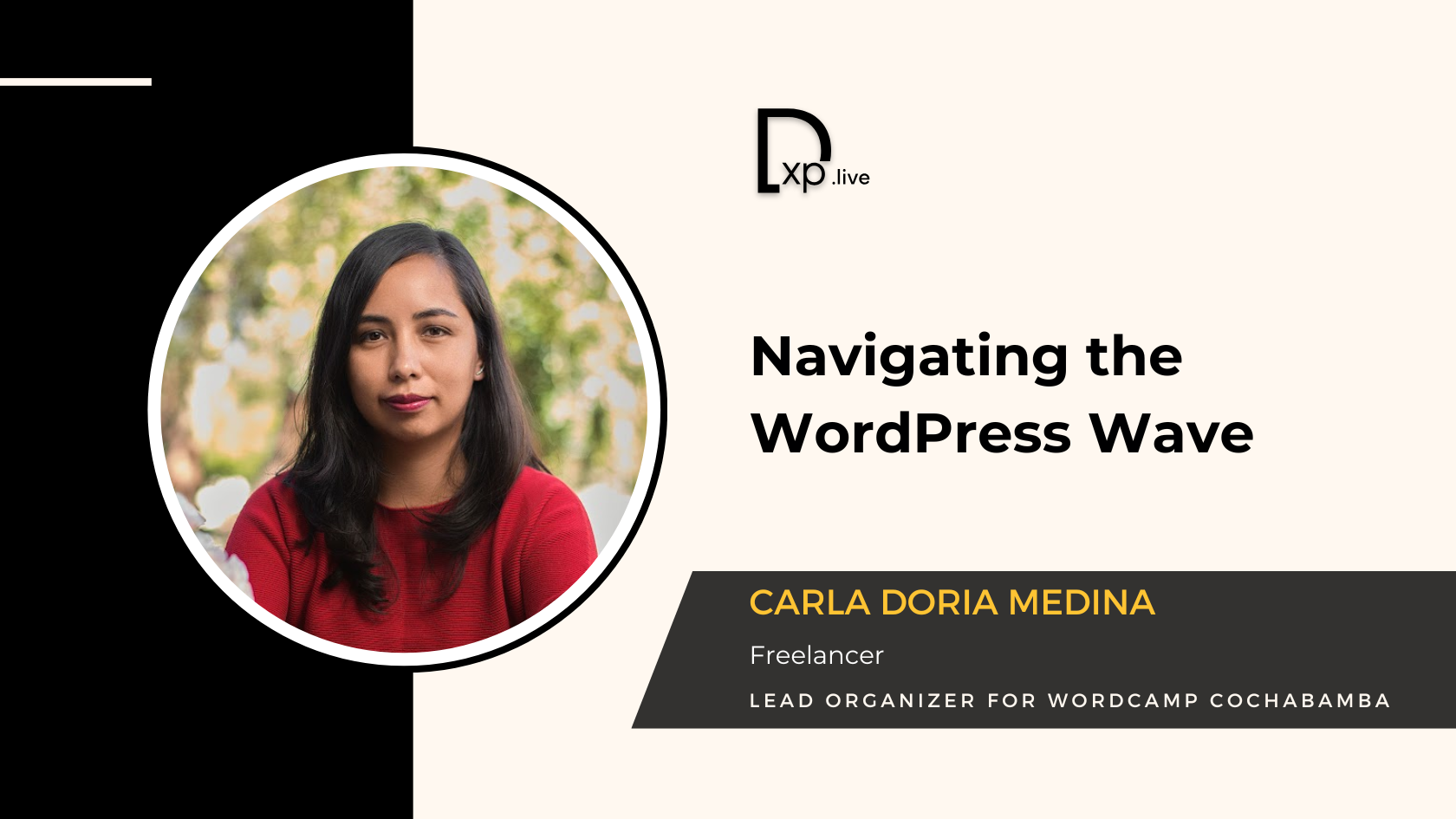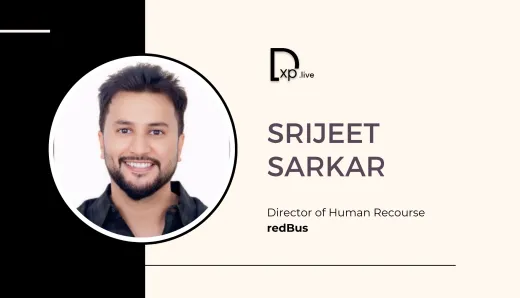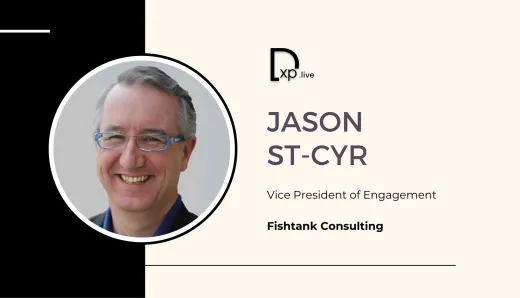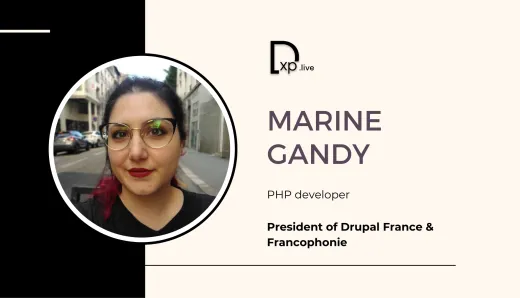Navigating the WordPress Wave: Carla Doria’s Impact
Bridging Content and Leadership in the WordPress World

Carla Doria Medina is a technical writer and an active member in the WordPress community, renowned for her expertise in creating multifaceted technical documentation tailored to diverse audience levels. With a robust background in software companies, Carla specializes in developing engaging training content, webinars, and presentations aimed at enhancing employee skills and streamlining customer support.
Beyond her technical writing prowess, Carla is an adept content creator whose materials serve as essential resources for both new hires and seasoned employees. Her ability to distill complex information into clear, actionable insights is complemented by her skill in data analysis and information gathering, which further enriches the content’s relevance and utility.
As a bilingual communicator fluent in both English and Spanish, Carla has made significant contributions as a public speaker, delivering compelling speeches at various international conferences and events. Her engagements include notable WordPress events such as WordCamp Mexico, WordCamp Guayaquil, and WordCamp Colombia, as well as local business forums and tech meetups.
INTRODUCTION
In this feature, we delve into the vibrant world of WordPress through the eyes of Carla Doria Medina, a seasoned technical writer and public speaker deeply embedded in the WordPress community. With extensive experience spanning several years, Carla has actively contributed to WordPress events across Latin America and served as the lead organizer for WordCamp Cochabamba. Her dual expertise in English and Spanish enables her to bridge linguistic gaps and bring diverse perspectives into the realm of technical documentation and public speaking. Today, Carla shares her insights on the evolution of WordPress, the challenges of creating bilingual technical content, and her vision for the future of this dynamic platform. Join us as we explore her journey and the broader trends shaping WordPress in Latin America and beyond.
You started your journey as a freelance translator before transitioning to a full-time role at Automattic. What were the biggest challenges and opportunities during this transition, and how did your freelance experience shape your approach to technical writing?
Carla: Yes, my background is actually in industrial engineering, which feels like a completely different life now. I wasn't happy with that path, so I decided to make a change and got into translation work over 10 years ago. Before Automattic, I had the chance to work with JalaSoft, a local company here in Bolivia, and that’s where I first stepped into technical writing.
It happened almost by coincidence—they needed someone with a strong command of English, which isn't as common in Bolivia, especially in a technical context. So they had me take some tests, and that was my introduction to technical writing. I quickly realized that translation, especially of technical documents, is challenging. Some technical terms just don’t have direct translations in Spanish, and it can feel like a different beast. I even had to handle legal documents sometimes, which was tougher.
My freelance experience taught me how to work independently, set my schedule, and organize my time, which was invaluable when I started working remotely at Automattic. Switching from industrial engineering to a tech-focused career was a great fit because I found I loved both writing and working with software. I didn’t have a background in programming, which was a challenge at times, but I discovered a lot of fulfillment in navigating these new areas.
As for communication skills, it's funny—people often compliment me on that, but it doesn’t always feel like a strength to me. However, seeing those recommendations from my colleagues at Automattic and elsewhere has been encouraging, and it’s helped me see how important that skill has been throughout my career.
Having been deeply involved in the WordPress ecosystem, how have you seen the platform evolve in Latin America? What are the key trends and opportunities you foresee for WordPress in the region?
Carla: There’s a lot of growth potential for WordPress in Latin America. While the WordPress community is more established and active in other parts of the world, in Latin America, it’s still fairly new—maybe around a decade old. For instance, my community in Cochabamba, Bolivia, is quite small, but it’s the only WordPress community in the entire country. Interestingly, Cochabamba isn’t even the largest city here; other cities like La Paz and Santa Cruz are showing interest in starting their own communities, which is a good sign.
I see more awareness and community building as the main trends moving forward. There are WordPress developers everywhere, but not a strong sense of community yet. I hope we’ll eventually have a regional WordCamp for Latin America. There’s been some talk, but nothing has happened so far.
Regarding current WordCamps, there are usually only two or three per year in the entire region, which is quite low given the number of countries. Costa Rica and Colombia have very active communities and hold events more regularly, but in smaller countries like Bolivia, organizing a WordCamp can be challenging due to limited resources and volunteers.
In my city, I’m working to encourage people in other areas who are interested in forming their own communities. We’ve had about eight years of experience, so I try to support and guide them whenever possible. There’s also a Slack channel that we use to connect with other Latin American WordPress communities, though it hasn’t been very active lately. It might be worth revisiting or even expanding to bring more people together.
With experience in both English and Spanish content creation, what are the unique challenges of writing technical documentation for a bilingual audience, and how do you ensure consistency and clarity across languages?
Carla: In most cases, I worked with existing English guides and then translated them into Spanish, which came with a few unique challenges. First, some technical terms just don’t translate well, or they sound odd in Spanish, so we often just keep the English term to avoid confusion.
Then, there's the variation in Spanish across different countries. For example, the word ‘click’ is used widely, but it’s spelled differently or even replaced by other terms depending on the region. As a team, we had to agree on which term to use so it would be understood across all Spanish-speaking countries, and that took some coordination.
In the end, I actually find writing more fulfilling than translating because it allows for creativity, whereas translation can feel more routine. Oddly enough, I mostly write in English—even creative work like fiction—because all my technical writing training was in English, and I’ve become more comfortable with the structure and rules over the years, even though Spanish is my native language.
With the rise of AI and automation tools, where do you see the future of technical writing heading to? What role do you think human writers will continue to play in crafting technical documentation?
Carla: I like this question because I’m a big advocate for AI. I know not everyone is, but I think AI is something we should embrace. It won’t replace us; it’ll just make our work more efficient. I use AI for more than just writing; I also use it for creating video content. For writers, tools like ChatGPT can be helpful for brainstorming ideas, structuring content, or even coming up with titles, which can be surprisingly hard.
However, I still prefer to do the actual writing myself because AI-generated content is usually easy to spot.
"There’s just something about it that feels off, and if I start with AI and then try to edit, I end up spending more time fixing it than if I’d written it from scratch. So, I typically use AI to support my process rather than replace it".
In the future, I think AI will continue to help us be more efficient, but it’ll also raise expectations. Where you might’ve been expected to finish a tutorial in a day, AI will allow us to deliver faster, meaning people may expect more from us. So, yes, AI will change the landscape, but human writers will still play an essential role in adding that personal touch and quality control.
You recently joined the organizing team for WordCamp US 2024. What were the key highlights and challenges of this event, and how does it compare to other WordCamps you’ve been part of?
Carla: It was an amazing experience, and I really enjoyed it. This was my first time working on such a large event since the WordCamp we did in Cochabamba was much smaller. For WordCamp US, I was part of the programming team, and most of our work happened before the event, which gave me a great insight into how such a large event operates behind the scenes. The scale was so much bigger than anything I’d been involved in before. Ensuring we had top speakers and interesting topics was a key highlight for me, and it’s something I hope to bring back to my local community.
Joining the larger team was a bit nerve-wracking at first since I come from a smaller community, but the WordPress ecosystem has consistent guidelines for all WordCamps, so that helped make the transition smoother. Eventually, I felt comfortable, and by the final meetings, it really felt like my team.
Compared to being the lead organizer in Cochabamba, working on WordCamp US was actually easier in some ways. In Cochabamba, I had to oversee everything, which meant managing multiple teams and handling all the responsibilities myself. For WordCamp US, I was part of a larger structure with many team leads and felt well-supported throughout. It was less pressure overall, and having others to collaborate with made all the difference.
Are there any upcoming WordPress events you're planning to participate in or organize? How do you see your role in these future events contributing to the WordPress community?
Carla: I'm thrilled about the upcoming regional WordCamps across Latin America, where I will further develop my leadership role. I'm also spearheading a new initiative aimed at boosting participation among women in the WordPress community. These efforts build on my experiences as the lead organizer of WordCamp Cochabamba, where I facilitated a three-day online event that brought together diverse voices and talents within the WordPress ecosystem.
My aim for these upcoming events is to foster an environment of inclusivity and mentorship, similar to what we achieved in Cochabamba. By leading workshops and discussions, I plan to empower attendees, encouraging more individuals to actively contribute to WordPress. This engagement is crucial for sustaining the platform's innovation and accessibility, ensuring it continues to serve as a powerful tool for community building and digital empowerment.
Looking forward, what are your personal and professional aspirations within the WordPress community?
Carla: As a technical writer, I think it’s really easy to get involved in the WordPress ecosystem, even if your background is in other industries or software. One of the best things about WordPress communities is how open they are. You don’t need any specific level of expertise to join. In my community, for example, many people started out with zero knowledge of WordPress, but through meetups and connecting with others, they’ve learned a lot. WordPress communities are genuinely some of the friendliest, and you can gain so much from just being around other passionate people. For technical writers especially, it’s an ideal ecosystem to jump into and start contributing.
Professionally, I aim to continue advocating for and contributing to the scalability and accessibility of WordPress to foster global digital literacy and empowerment. Personally, I am committed to mentoring newcomers to the WordPress community, especially young women and underrepresented groups, to take active roles in technology.




